This piece was originally published in the October 21, 2020 edition of CAP Action’s weekly newsletter, What’s Trending? Subscribe to What’s Trending? here.
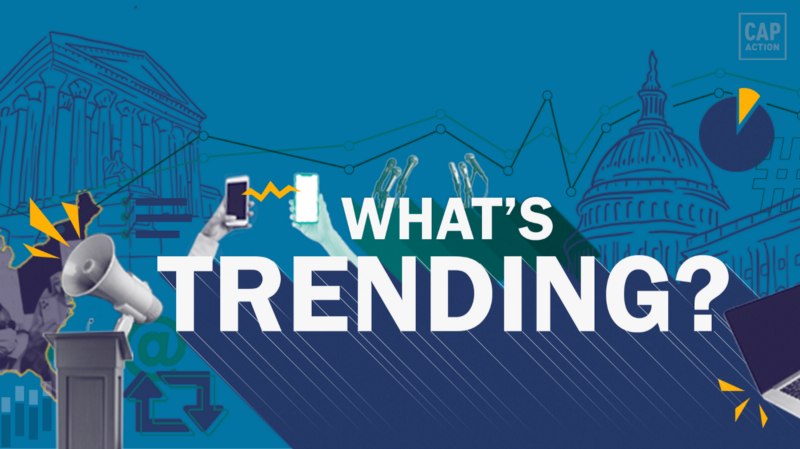
Hey, y’all.
The Godfather is one of my favorite movies. You don’t spend a year working in northern New Jersey and NOT develop an affinity for gangster films.
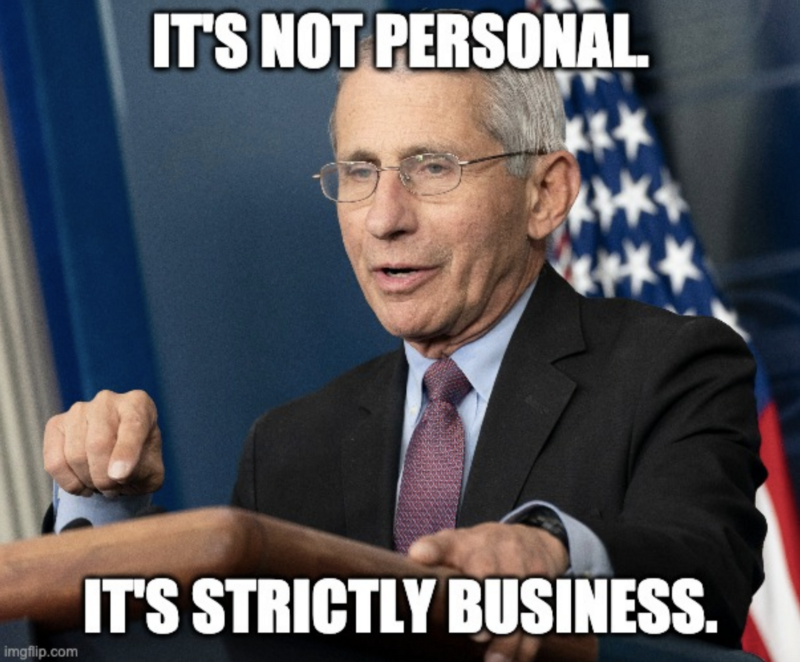
So when I saw that American hero Dr. Anthony Fauci used it in a recent interview to illustrate that his criticism of the Trump administration is based on improving Americans’ health, not slinging mud for the heck of it, I let out a cheer from my spare bedroom office set up.
We’re seeing a huge surge in coronavirus cases across the country, and Trump is, once again, refusing to lead. So this week we’re examining the conversation around the coronavirus epidemic, Dr. Fauci’s iconic 60 Minutes interview, and Trump’s failed response.
But first, did you miss last week’s edition of What’s Trending? Don’t worry — you can read it here.
WHAT’S TRENDING THIS WEEK
- Both Donald Trump and Joe Biden participated in town halls last Thursday, October 15, in lieu of the cancelled joint town hall by the Commission on Presidential Debates. Biden won the ratings battle, reaching 14.1 million people compared to Trump’s 13.5 million.
- Efforts to pass another coronavirus relief package continue to fail, despite the House passing the HEROES Act in May. The White House has continued negotiations with Democratic leadership, but Senate Majority Leader Mitch McConnell remains committed to withholding any packages negotiated outside of the Senate from a floor vote.
- 8 million people have been forced into poverty since May, according to a report by the New York Times, as coronavirus relief funds have dried up. Researchers found that the expanded unemployment benefits and stimulus checks provided by the CARES Act kept more than 18 million people from poverty at its peak — a historic display of the potential successes of a strong safety net.
WHAT WE’RE HEARING ON SOCIAL
Here are this week’s top five Facebook posts on the Left and Right:
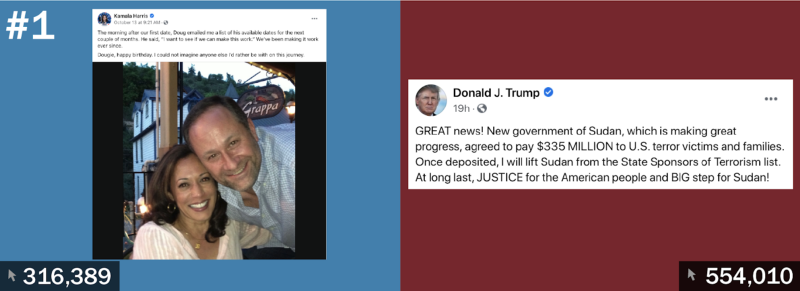
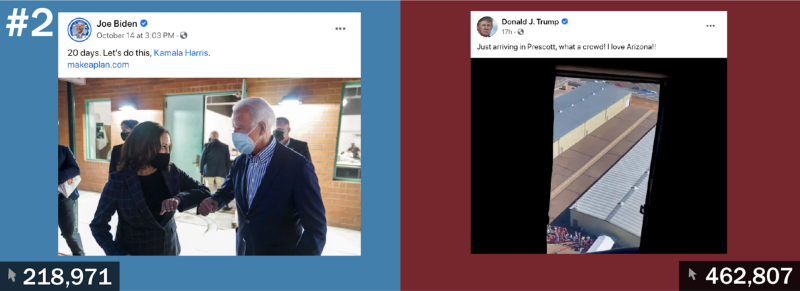
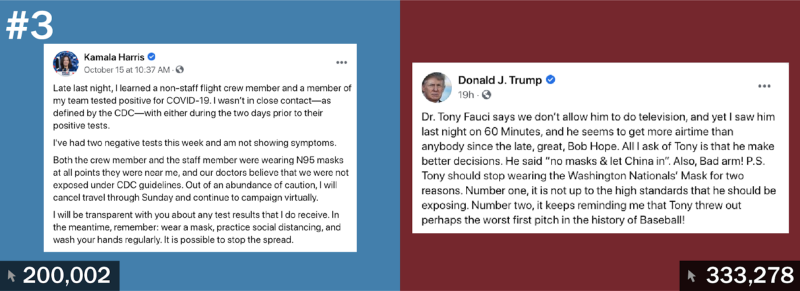
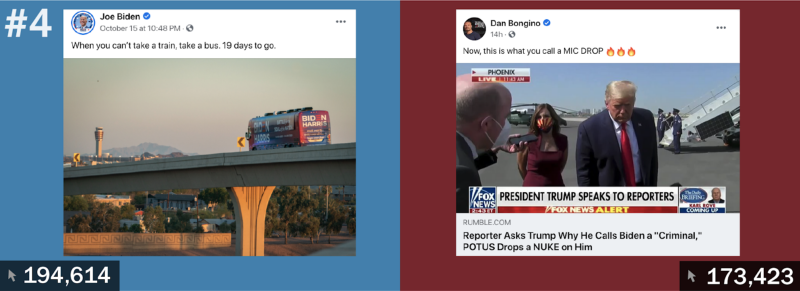
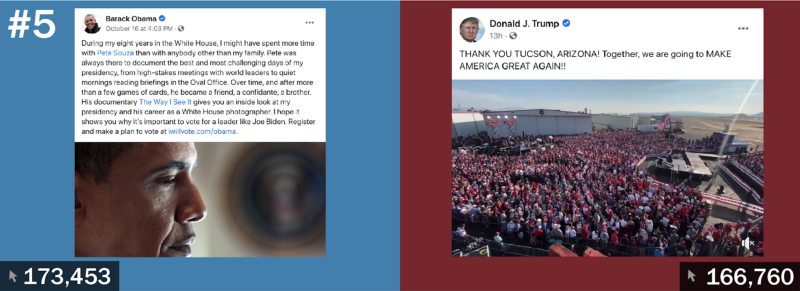 Five best-performing Facebook posts by total interactions among 200 of the largest conservative and progressive pages for the week of October 13–19, according to data from NewsWhip
Five best-performing Facebook posts by total interactions among 200 of the largest conservative and progressive pages for the week of October 13–19, according to data from NewsWhip
The business of stopping COVID: Tension between Trump and Dr. Anthony Fauci has been rising for the past few months, so it’s no surprise that, following Dr. Fauci’s Sunday evening 60 Minutes interview, Trump took to social media to discredit the National Institute of Allergy and Infectious Diseases director.
Early in the pandemic, coronavirus and Dr. Fauci often dominated the political conversation on Facebook, but as Americans grew more and more fatigued by COVID-19, its restrictions on daily life, and frequent news coverage, they have somewhat faded to the background.
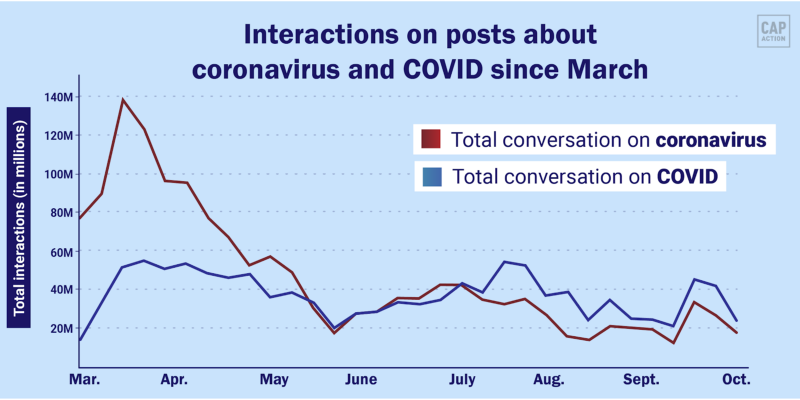 Facebook posts since March mentioning COVID or coronavirus, according to data from NewsWhip
Facebook posts since March mentioning COVID or coronavirus, according to data from NewsWhip
Now, the country is facing a third resurgence of the virus. The number of cases is increasing as we head into the winter with new cases rising in at least 38 states and seven states hitting new daily records for coronavirus infections. A majority of Americans continue to cite the pandemic as the top issue for the president and Congress to address, according to Navigator research.
With Trump abdicating his responsibility to lead the country and responsibly manage the pandemic, Dr. Fauci’s role as a logical, stable public health expert is increasingly important.
All of this makes disparaging posts about Dr. Fauci, especially those coming from the president of the United States, even more dangerous. Overall, in the wake of this dust up, left-leaning pages posted more frequently about Dr. Fauci — 12 times since the interview, garnering almost 190,000 interactions. Conservative pages, on the other hand, posted only four times since the interview, but those four posts garnered more than 380,000 interactions — twice as many as progressives’.
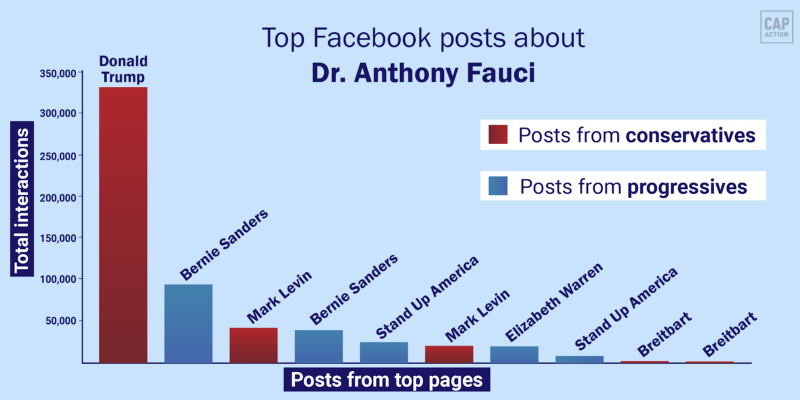 Most interacted-with posts about Dr. Fauci from October 13–19, according to data from NewsWhip.
Most interacted-with posts about Dr. Fauci from October 13–19, according to data from NewsWhip.
And while beating the coronavirus shouldn’t be a partisan subject, the content of posts from pages on the right points to their deeply biased approach to the topic.
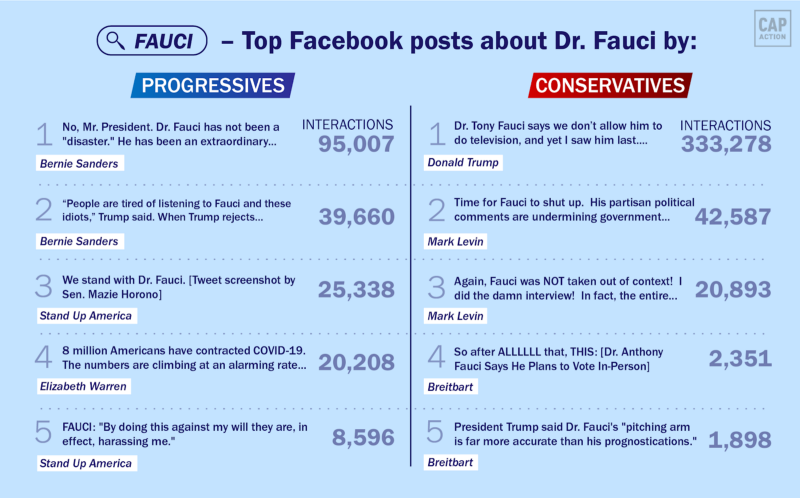 Top five Facebook posts from conservative and progressive pages about Dr. Fauci, according to data from NewsWhip
Top five Facebook posts from conservative and progressive pages about Dr. Fauci, according to data from NewsWhip
Does this make you want to help get the facts out more frequently on Facebook about the pandemic we’re currently struggling through? I hope so. Here are a few tips:
- Use data to provide context. Help your audience understand the scale of the pandemic by using data visualizations. This one from CAP Action illustrates the scope of rising cases in the U.S.
- Emphasize the science. The pandemic isn’t political, and the response to it shouldn’t be either. Check out this video from Joe Biden, which gets that message across.
- Illustrate the human cost of the pandemic. The DNC War Room did this very effectively in their Facebook video, “Samantha”.
SAY IT WITH ME
- According to an article in the Wall Street Journal, Mark Zuckerberg has developed cozy relationships with conservative Facebook personality Ben Shapiro and Jared Kushner.
- It also reports that Zuckerberg himself approved 2017 changes to the Facebook news feed algorithm so that left-leaning sites like Mother Jones were targeted, out of concern about potential impacts to conservative sites like Shapiro’s Daily Wire.
- Read this Twitter thread by Mother Jones Editor-in-Chief Clara Jeffery for more context.
The bottom line: Facebook intentionally penalized progressive news outlets because it was concerned about how conservative “news” sites, several of whose publishers Zuckerberg is close with, would be impacted.
ON MY RADAR
- Tomorrow, October 22, is (tentatively) the final presidential debate. It will air from 9–10:30pm ET on all major networks.
Where: Belmont University in Nashville, TN
How to watch: The debate will air on most major news networks, and the Washington Post will have an uninterrupted live stream.
Moderator: Kristen Welker, NBC News White House correspondent
- On Friday, October 23, the Center for American Progress will be hosting a panel on countering election disinformation on social media. RSVP here.
ASK ALEX
This week a reader writes, “Help! My video reach is tanking on Facebook. What should I do?”
Oh, friend. You are not alone.
We’ve seen video reach take a nosedive across Facebook the past few months. Here are a few things you can do to combat it:
- Consider using graphics instead of video when possible. Graphics are easy to interact with, and engagements are the primary driver of the Facebook algorithm right now.
- Keep an eye on your video retention. This can help you understand where in the video your audience is dropping off, and you can use that information to inform future videos. This is important because Facebook is optimizing toward videos people watch for longer periods of time.
- Optimize video for the platform. Using the same content on Twitter, Facebook, and Instagram just won’t cut it anymore. Facebook videos should be at least three minutes long.
Thanks so much for your questions and your time!
Have a great week,
Alex
P.S. Please do forward along to your friends who are interested or encourage them to sign up here.
This newsletter is written by me, Alex Witt (@alexandriajwitt), a progressive political strategist and Dolly Parton enthusiast (she/her). I’ve managed social media programs for presidential candidates, political committees, progressive advocacy organizations, and more.